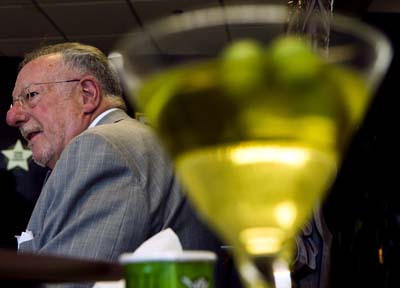Court goes against Culinary union on ballot measures
Two ballot measures challenging the way Las Vegas handles redevelopment should not be part of the June 2 city elections, a judge ruled Friday, a decision welcomed by city leaders who worried that the measures would destroy the city’s push to invigorate a struggling downtown.
The decision will be appealed to the Nevada Supreme Court, but that didn’t dampen the jubilation of Las Vegas Mayor Oscar Goodman.
“I’ve never been a good winner,” Goodman said at a late press conference after the ruling came out, during which he used language in the ruling to take swipes at the leadership of Culinary Workers Union Local 226, who spearheaded the push for the measures.
“As far as I’m concerned, I have no relationship with the Culinary leadership, the way they’ve acted,” the mayor said. “They’re not good citizens.”
In a prepared statement, union Secretary-Treasurer D. Taylor said the city should be willing to let people vote on proceeding with large projects like a new, and controversial, city hall building.
“Fourteen thousand Las Vegas voters said they want the right to vote on how their tax dollars are spent by the city,” he said, referring to the number of signatures collected to support the ballot measures. “We will continue to fight for their constitutional right to bring this issue to the voters.”
That right was not at issue in Judge David Barker’s decision. He said the measures violated state laws governing such measures, misled voters about the effects of approving them and would give voters powers that even the Las Vegas City Council doesn’t have.
The first, an initiative, had two sections. One said voters must approve annual appropriations of $2 million or more in order to pay back a “lease-purchase” agreement on a public building. That’s the financing option being considered for the new city hall.
The second section said voters, instead of council members, would have authority over creating or changing the city’s redevelopment plan.
Barker noted that state law says that initiatives must “embrace but one subject and matters necessarily connected.”
“The initiative petition includes two distinct subjects,” he wrote. “They are not functionally related or germane to one another.”
The other measure asks voters to repeal the ordinance setting out the city’s redevelopment plan, which defines the redevelopment area and guides the city’s efforts to attract development to that area. Increased property tax revenue flowing from development there is used for infrastructure improvements and incentives to developers.
The petition signed by supporters said the repeal “would prevent the Redevelopment Agency from undertaking further redevelopment projects ... or incurring further indebtedness to support such additional projects.”
While that’s true, Barker said, it doesn’t tell the whole story.
“The petition fails to inform the voters of the true effect ... termination of the redevelopment plan and the impairment of the outstanding securities,” the ruling states. “Failure to inform the signers of the true effect” makes the petition invalid.
City leaders had argued that repealing the redevelopment plan would remove the revenue stream backing $80 million in bonds and tax incentives, and that the city didn’t have sufficient revenue elsewhere to make up the shortfall. That would’ve led to litigation and a black mark on the city’s ability to borrow money.
There’s also state law governing how to implement a “material deviation” from a redevelopment plan, Barker wrote, and the referendum would violate it.
Goodman said he’d been advised that if the decision went against the city, an appeal would be pointless, and he assumed that would hold true if the city prevailed.
“It’s a learned opinion that I believe can withstand any kind of criticism,” he said.
If the decision holds up, the city will once again be free to pursue downtown projects, including the new city hall. The fact that the ballot measures existed made it hard to line up project financing, the mayor said.
“It put a cloud over everything the city was trying to do,” Goodman said. “It put our bonding ability in question. Now that that’s removed, I think we’re going to go forward.”
Contact reporter Alan Choate at achoate@reviewjournal.com or 702-229-6435.
Download PDF of court decision



















